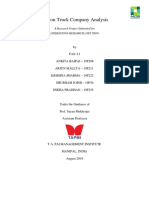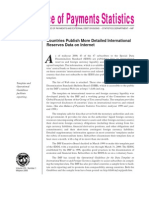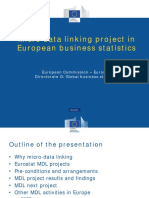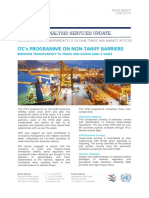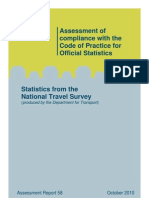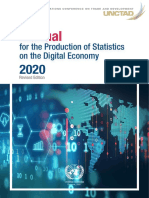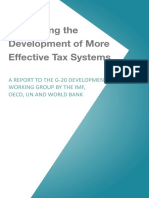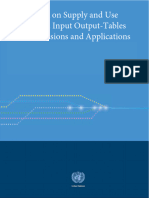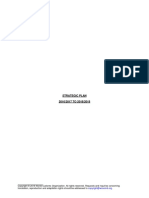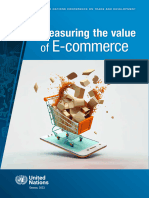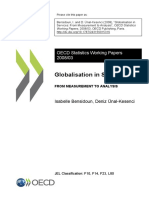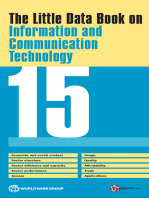CCSA - Best Practicies For Ensuring Quality in Int - Stat.ver2.2
Uploaded by
Unctad StatCopyright:
Available Formats
CCSA - Best Practicies For Ensuring Quality in Int - Stat.ver2.2
Uploaded by
Unctad StatOriginal Title
Copyright
Available Formats
Share this document
Did you find this document useful?
Is this content inappropriate?
Copyright:
Available Formats
CCSA - Best Practicies For Ensuring Quality in Int - Stat.ver2.2
Uploaded by
Unctad StatCopyright:
Available Formats
Quality Enhancement in International Merchandise Trade Statistics
Henri Laurencin Head Development Statistics and Information Branch UNCTAD
CCSA: Special Session on Best Practice for Ensuring Quality in International Statistics Athens, Greece, 29 May 2012
CCSA: Best Practice for Ensuring Quality in International Statistics
When statistics raise questions
Mail received at UNCTAD in April 2011 from UN Headquarters: Need urgent, quick assistance on question: there continues to be reluctance by the
xx delegate to resolve a discrepancy between OHRLLS/UNCTAD on one side and WTO on the other concerning LDCs exports as a share of world trade.
OHRLLS: UN Office of the High Representative for the Least Developed Countries, Landlocked Developing Countries and Small Island Developing States
CCSA: Best Practice for Ensuring Quality in International Statistics
Discrepancies?
Gambia: total merchandise exports ($ millions)
Sources IMF - Balance Of Payments IMF - Direction Of Trade IMF - International Finance Statistics World Bank - WDI UNSD - Comtrade UNCTAD WTO Economic Intelligence Unit Common Data Set April 2011 2000 46 15 15 16 15 15 15 15 2001 27 10 10 6 10 10 4 10 2002 31 13 12 4 13 12 5 13 2003 68 18 8 8 5 8 8 8 8 2004 107 38 10 10 18 10 10 10 10 2005 104 28 8 8 5 8 8 8 8 2006 109 35 11 21 11 11 11 12 11 2007 134 43 13 13 13 13 13 13 13 2008 206 51 14 14 14 14 14 14 14 2009 174 55 15 15 66 15 15 21 15 2010 167 61 15 15 35 15 15 17 15
CCSA: Best Practice for Ensuring Quality in International Statistics
Prerequisite for improvement
1. Better quality of merchandise trade statistics received from national statistical systems, especially from developing countries
2. Better access of International Organizations (IOs) to national statistics by establishing effective cooperation
CCSA: Best Practice for Ensuring Quality in International Statistics
Ways to be followed to improve quality
Agree on a definition of international merchandise trade statistics
Act by: Providing guidance to national data compilers on the collection and compilation of international merchandise trade statistics in line with agreed definitions Building statistical capacity in countries Sharing knowledge and statistics at the international level
CCSA: Best Practice for Ensuring Quality in International Statistics
TFIMTS
Creation in 1992 of the Inter-Agency Task Force on International Merchandise Trade Statistics (TFIMTS) to improve international cooperation in the collection, processing and dissemination of international merchandise trade statistics. The Inter-Agency Task Force on International Merchandise Trade Statistics is convened by the WTO and gathers specialists from Eurostat, FAO, IMF, OECD, UN Statistics Division, UNCTAD and UN Regional Commissions.
CCSA: Best Practice for Ensuring Quality in International Statistics
Achievements of TFIMTS
Establish international standards governing the measurement of trade statistics. Publication of the International Merchandise Trade Statistics: concepts and definitions (IMTS) Manual (last version endorsed by the UN Statistical Commission in 2010); Prepare data compilation recommendations set forth in the International Merchandise Trade Statistics: Compilers Manual + National compilation and reporting practices in IMTS; Support the organization of workshops, seminars and trainings at the country and regional levels.
CCSA: Best Practice for Ensuring Quality in International Statistics
Discrepancies persist 20 years later. Why?
IMF, Eurostat, OECD and UN Statistics Division are primary data compilers, thus collect data directly from different national sources (Central Bank, National Statistical Office, Ministry of Trade or Customs Department); IMF BOP data (based on Balance of Payment Manual) may have different figures as the concepts are not 100% in-line with other sources data (based on IMTS Concepts and Definitions). EU Community concept is also slightly different; IMTS Concepts and Definitions recommends to include re-exports and to exclude goods in transit from official statistics. There is possible mix-up between re-exports and transit. If goods in transit are included, it inflates trade statistics. If re-exports are excluded, it minimizes trade statistics; Methodology for estimating missing data is not fully harmonized.
CCSA: Best Practice for Ensuring Quality in International Statistics
Towards a common data set
Eurostat, OECD, UNSD, UNCTAD and WTO decided to joint their efforts and to reconcile their time series on merchandise trade statistics using international standards as a benchmark; They created and maintain the Common Data Set (CDS); Each agency is in charge of supplying figures for a predefined set of reporting economies. Reconciliations consist of scrutinizing significant differences between the agencies' data to determine the best value. In many instances, this results in finding an agreement on substitution of values and estimates; The CDS database gives access to statistics and documentation (metadata) of both officially reported and reconciled series. It covers annual total merchandise export and import values of over 200 economies for the period from 1995 to 2010.
CCSA: Best Practice for Ensuring Quality in International Statistics
Still discrepancies exist
Gambia: total merchandise exports ($ millions)
Source IMF Balance Of Payments IMF Direction Of Trade IMF International Financial Statistics World Bank WDI UNSD-Comtrade UNCTAD WTO EIU Common Data Set CDS (Dec.2011) Common Data Set CDS (Dec.2012) 2
1 2
2000
2001
2002
2003 68 18 8 8 5 8 8 8 8 8
2004 107 38 10 10 18 10 10 10 10 10
2005 104 28 8 8 5 8 8 8 8 8
2006 109 35 11 21 11 11 11 11 11 11
2007 134 43 13 13 13 13 13 13 13 13
2008 206 51 14 14 14 14 14 14 14 14
2009 174 56 15 15 66 66 1 66 15 15 66
2010 167 62 15 15 35 35 35 15 15 35
2011
46 15 15 16 15 15 15 15 15
27 10 10 6 10 10 12 10 10
31 13 12 4 13 12 15 13 13
118
95 33 40 16 33
Break in series starting 2009. Data includes partially re-exports. Forthcoming
But they are better identified!
CCSA: Best Practice for Ensuring Quality in International Statistics
Summing up (1/3)
No official statistics should be released without metadata (cf. Principles governing international statistical activities);
National agencies involved in data collection on a same subject matter (ex. Central Bank, National Statistical Office and Customs on IMTS) need to synchronize their activities at the country level;
International organizations involved in the collection and dissemination of statistics on a same subject matter should better coordinate (for instance to minimize reporting burden and avoid the release of contradictory statistics);
CCSA: Best Practice for Ensuring Quality in International Statistics
Summing up (2/3)
Initiatives from IOs to create common data sets by reconciling their time series (ex. CDS of IMTS) using international standards as benchmarks should be encouraged; A Common Data Set should not be seen by IOs as a restriction to the release of their own sets:
IOs can refer to a different standard for any reason (for ex. in case of the calculation of a derived indicator)
Coordination needs time and IOs should not be prevented to release their advanced statistics
CCSA: Best Practice for Ensuring Quality in International Statistics
Summing up (3/3)
Improved quality of statistics released by IOs and better use of resources can be assured by sharing data, information, methodology and more generally knowledge and expertise. UNCTAD and WTO are joining their efforts to fully harmonize their statistics on trade in merchandise and services; Last but not least, never forget the users of international statistics and properly assess their needs and expectations.
CCSA: Best Practice for Ensuring Quality in International Statistics
Thank you for attention
You might also like
- Country Presentation Statistics TanzaniaNo ratings yetCountry Presentation Statistics Tanzania6 pages
- Balance of Payments Statistics: Countries Publish More Detailed International Reserves Data On InternetNo ratings yetBalance of Payments Statistics: Countries Publish More Detailed International Reserves Data On Internet16 pages
- 2012 09 25 CPP Sess2 4 Degain Wto Made in World InitiativeNo ratings yet2012 09 25 CPP Sess2 4 Degain Wto Made in World Initiative13 pages
- Comparative Study of Data Reported To The OECD Creditor Reporting System (CRS) and To The Aid Management Platform (AMP)No ratings yetComparative Study of Data Reported To The OECD Creditor Reporting System (CRS) and To The Aid Management Platform (AMP)38 pages
- 2015 Global Report: Trade Facilitation and Paperless Trade Implementation SurveyNo ratings yet2015 Global Report: Trade Facilitation and Paperless Trade Implementation Survey44 pages
- UK Overseas Trade Statistics: The User StoryNo ratings yetUK Overseas Trade Statistics: The User Story40 pages
- 2016-Q4-Market Analysis Services UpdateNo ratings yet2016-Q4-Market Analysis Services Update12 pages
- Factors Affecting Gross Domestic Product: Department of Management Information Systems (MIS), University of DhakaNo ratings yetFactors Affecting Gross Domestic Product: Department of Management Information Systems (MIS), University of Dhaka9 pages
- Images Assessment Report 58 National Travel Survey Tcm97 34769No ratings yetImages Assessment Report 58 National Travel Survey Tcm97 3476924 pages
- Rauschendorfer and Twum 2020 Final ReportNo ratings yetRauschendorfer and Twum 2020 Final Report36 pages
- Use of Tourism Statistics in Macro-Economic & Business PlanningNo ratings yetUse of Tourism Statistics in Macro-Economic & Business Planning38 pages
- Presentation Outline: Development in The Greater Mekong Subregion: Connectivity, Community, and CompetitivenessNo ratings yetPresentation Outline: Development in The Greater Mekong Subregion: Connectivity, Community, and Competitiveness15 pages
- International Yearbook of Industrial Statistics 2018100% (1)International Yearbook of Industrial Statistics 2018673 pages
- Narrowing Trade Deficit Through Increased Import SubstitutionNo ratings yetNarrowing Trade Deficit Through Increased Import Substitution21 pages
- Supporting The Development of More Effective Tax SystemsNo ratings yetSupporting The Development of More Effective Tax Systems54 pages
- P Data Extract From World Development IndicatorsNo ratings yetP Data Extract From World Development Indicators14 pages
- IMF OECD 2019 - Progress Report On Tax CertaintyNo ratings yetIMF OECD 2019 - Progress Report On Tax Certainty54 pages
- Brochure - Recommendation of The OECD Council On Good Statistical Practice March2019No ratings yetBrochure - Recommendation of The OECD Council On Good Statistical Practice March201929 pages
- Multi-Year Expert Meeting On Enhancing The Enabling Economic Environment at All Levels in Support of Inclusive and Sustainable DevelopmentNo ratings yetMulti-Year Expert Meeting On Enhancing The Enabling Economic Environment at All Levels in Support of Inclusive and Sustainable Development30 pages
- 2022 FEALAC E-Commerce Proposal ECLAC-ESCAP 24.05.2022No ratings yet2022 FEALAC E-Commerce Proposal ECLAC-ESCAP 24.05.202211 pages
- Imf Government Finance Statistics YearbookNo ratings yetImf Government Finance Statistics Yearbook4 pages
- Background Note On "Historical Statistics" in (March 2010)No ratings yetBackground Note On "Historical Statistics" in (March 2010)5 pages
- Globalisation in Services: OECD Statistics Working Papers 2008/03No ratings yetGlobalisation in Services: OECD Statistics Working Papers 2008/0338 pages
- Freight Transportation Arrangement Revenues World Summary: Market Values & Financials by CountryFrom EverandFreight Transportation Arrangement Revenues World Summary: Market Values & Financials by CountryNo ratings yet
- The Little Data Book on Information and Communication Technology 2015From EverandThe Little Data Book on Information and Communication Technology 2015No ratings yet
- Traveler Accommodation Revenues World Summary: Market Values & Financials by CountryFrom EverandTraveler Accommodation Revenues World Summary: Market Values & Financials by CountryNo ratings yet
- Mineral Classifying, Flotation, Separating, Concentrating, Cleaning Equipment World Summary: Market Sector Values & Financials by CountryFrom EverandMineral Classifying, Flotation, Separating, Concentrating, Cleaning Equipment World Summary: Market Sector Values & Financials by CountryNo ratings yet
- The Little Data Book on Information and Communication Technology 2017From EverandThe Little Data Book on Information and Communication Technology 2017No ratings yet
- Achromatic Number of Some Graphs Formed From The Tensor Product of Simple GraphNo ratings yetAchromatic Number of Some Graphs Formed From The Tensor Product of Simple Graph10 pages
- Urban Studies An Exploration in Theory and PracticesNo ratings yetUrban Studies An Exploration in Theory and Practices30 pages
- Rules and Instructions: Federal Urdu University of Arts, Science and Technology Islamabad, PakistanNo ratings yetRules and Instructions: Federal Urdu University of Arts, Science and Technology Islamabad, Pakistan20 pages
- National Institute of Construction Management & Research Pune School of Distance EducationNo ratings yetNational Institute of Construction Management & Research Pune School of Distance Education21 pages
- PRF - Learning - PVSYST - Guidelines For Assumptions in Simulation - Ver 1 0No ratings yetPRF - Learning - PVSYST - Guidelines For Assumptions in Simulation - Ver 1 05 pages
- SSC - Describing Graphs and Charts With Answer Sheet0% (1)SSC - Describing Graphs and Charts With Answer Sheet12 pages
- Introduction To MATLAB For Engineers, Third EditionNo ratings yetIntroduction To MATLAB For Engineers, Third Edition49 pages
- Surviving Sepsis Campaign: International Guidelines For Management of Sepsis and Septic Shock: 2016No ratings yetSurviving Sepsis Campaign: International Guidelines For Management of Sepsis and Septic Shock: 201641 pages
- Data Envelopment Analysis: Models and Extensions: Production/Operations Management100% (2)Data Envelopment Analysis: Models and Extensions: Production/Operations Management4 pages
- Isolation and Characterization of Starter Culture From Spontaneous Fermentation of SourdoughNo ratings yetIsolation and Characterization of Starter Culture From Spontaneous Fermentation of Sourdough4 pages
- Balance of Payments Statistics: Countries Publish More Detailed International Reserves Data On InternetBalance of Payments Statistics: Countries Publish More Detailed International Reserves Data On Internet
- 2012 09 25 CPP Sess2 4 Degain Wto Made in World Initiative2012 09 25 CPP Sess2 4 Degain Wto Made in World Initiative
- Comparative Study of Data Reported To The OECD Creditor Reporting System (CRS) and To The Aid Management Platform (AMP)Comparative Study of Data Reported To The OECD Creditor Reporting System (CRS) and To The Aid Management Platform (AMP)
- 2015 Global Report: Trade Facilitation and Paperless Trade Implementation Survey2015 Global Report: Trade Facilitation and Paperless Trade Implementation Survey
- Factors Affecting Gross Domestic Product: Department of Management Information Systems (MIS), University of DhakaFactors Affecting Gross Domestic Product: Department of Management Information Systems (MIS), University of Dhaka
- Images Assessment Report 58 National Travel Survey Tcm97 34769Images Assessment Report 58 National Travel Survey Tcm97 34769
- Use of Tourism Statistics in Macro-Economic & Business PlanningUse of Tourism Statistics in Macro-Economic & Business Planning
- Presentation Outline: Development in The Greater Mekong Subregion: Connectivity, Community, and CompetitivenessPresentation Outline: Development in The Greater Mekong Subregion: Connectivity, Community, and Competitiveness
- International Yearbook of Industrial Statistics 2018International Yearbook of Industrial Statistics 2018
- Narrowing Trade Deficit Through Increased Import SubstitutionNarrowing Trade Deficit Through Increased Import Substitution
- Supporting The Development of More Effective Tax SystemsSupporting The Development of More Effective Tax Systems
- Brochure - Recommendation of The OECD Council On Good Statistical Practice March2019Brochure - Recommendation of The OECD Council On Good Statistical Practice March2019
- Multi-Year Expert Meeting On Enhancing The Enabling Economic Environment at All Levels in Support of Inclusive and Sustainable DevelopmentMulti-Year Expert Meeting On Enhancing The Enabling Economic Environment at All Levels in Support of Inclusive and Sustainable Development
- 2022 FEALAC E-Commerce Proposal ECLAC-ESCAP 24.05.20222022 FEALAC E-Commerce Proposal ECLAC-ESCAP 24.05.2022
- Background Note On "Historical Statistics" in (March 2010)Background Note On "Historical Statistics" in (March 2010)
- Globalisation in Services: OECD Statistics Working Papers 2008/03Globalisation in Services: OECD Statistics Working Papers 2008/03
- Freight Transportation Arrangement Revenues World Summary: Market Values & Financials by CountryFrom EverandFreight Transportation Arrangement Revenues World Summary: Market Values & Financials by Country
- The Little Data Book on Information and Communication Technology 2015From EverandThe Little Data Book on Information and Communication Technology 2015
- Traveler Accommodation Revenues World Summary: Market Values & Financials by CountryFrom EverandTraveler Accommodation Revenues World Summary: Market Values & Financials by Country
- Mineral Classifying, Flotation, Separating, Concentrating, Cleaning Equipment World Summary: Market Sector Values & Financials by CountryFrom EverandMineral Classifying, Flotation, Separating, Concentrating, Cleaning Equipment World Summary: Market Sector Values & Financials by Country
- The Little Data Book on Information and Communication Technology 2017From EverandThe Little Data Book on Information and Communication Technology 2017
- Achromatic Number of Some Graphs Formed From The Tensor Product of Simple GraphAchromatic Number of Some Graphs Formed From The Tensor Product of Simple Graph
- Urban Studies An Exploration in Theory and PracticesUrban Studies An Exploration in Theory and Practices
- Rules and Instructions: Federal Urdu University of Arts, Science and Technology Islamabad, PakistanRules and Instructions: Federal Urdu University of Arts, Science and Technology Islamabad, Pakistan
- National Institute of Construction Management & Research Pune School of Distance EducationNational Institute of Construction Management & Research Pune School of Distance Education
- PRF - Learning - PVSYST - Guidelines For Assumptions in Simulation - Ver 1 0PRF - Learning - PVSYST - Guidelines For Assumptions in Simulation - Ver 1 0
- SSC - Describing Graphs and Charts With Answer SheetSSC - Describing Graphs and Charts With Answer Sheet
- Introduction To MATLAB For Engineers, Third EditionIntroduction To MATLAB For Engineers, Third Edition
- Surviving Sepsis Campaign: International Guidelines For Management of Sepsis and Septic Shock: 2016Surviving Sepsis Campaign: International Guidelines For Management of Sepsis and Septic Shock: 2016
- Data Envelopment Analysis: Models and Extensions: Production/Operations ManagementData Envelopment Analysis: Models and Extensions: Production/Operations Management
- Isolation and Characterization of Starter Culture From Spontaneous Fermentation of SourdoughIsolation and Characterization of Starter Culture From Spontaneous Fermentation of Sourdough

